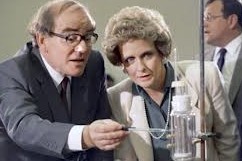 Martin Fleischmann was a British electrochemist and controversial co-discoverer of what has been labeled ‘cold-fusion’. Last week, Fleischmann reportedly died at his home in England.
Martin Fleischmann was a British electrochemist and controversial co-discoverer of what has been labeled ‘cold-fusion’. Last week, Fleischmann reportedly died at his home in England.
Fleischmann, one of the world’s leading electrochemists, and his partner Stanley Pons came to fame in 1989 when the two men claimed to have discovered a way to produce nuclear fusion in a room-temperature glass bottle. At the time, and in the years since, controversy has shadowed the still unproven discovery.
If substantiated, the cold fusion experiment, performed at the University of Utah, had the potential for a nearly limitless, clean and safe supply of energy. While fusion, the process that powers our sun, occurs at incredibly high temperatures, cold fusion reportedly occurred at room temperature with little radiation.
Sadly, when other scientists attempted to replicate and substantiate the experiment most failed. As a result cold fusion became known as junk science and research was rejected by the established scientific community – although Fleischmann and Pons continued their experiments in defense of their findings, and research continues among those on the ‘fringe’ of science.
Born in Nazi occupied Czechoslovakia in 1938, Fleischmann fled to England with his family where, in order to gain legal status for the move, he was adopted by a British bachelor. Fleischmann studied chemistry at the Imperial College in London where he was noted as having a strong grasp of mathematics and an imagination unusual for a chemist.
In 1967, Fleischmann headed the chemistry department of the University of Southampton and was a fellow of the Royal Society, Britain’s Academy of Sciences. After his retirement from Southampton, Southampton began to collaborate with Pons.
Fleischmann was an “exploratory genius,” said Michael Melich, a friend of Fleischmann and a research professor of physics at the Naval Postgraduate School in California.
In 2005, Fleischmann spoke to German news site Telepolis about his disappointment over the scientific community’s rejection of his cold fusion saying, “This has been a terrible experience.”
![Herbal Reference Substances are Key to Everyday Products <!-- AddThis Sharing Buttons above -->
<div class="addthis_toolbox addthis_default_style " addthis:url='http://newstaar.com/herbal-reference-substances-are-key-to-everyday-products/3512112/' >
<a class="addthis_button_facebook_like" fb:like:layout="button_count"></a>
<a class="addthis_button_tweet"></a>
<a class="addthis_button_pinterest_pinit"></a>
<a class="addthis_counter addthis_pill_style"></a>
</div>When it comes to quality control testing and the development of new products, Botanical Reference Materials (BRMs), also known as Herbal References are critically important. To help companies ultimately obtain all-important FDA approval, the Food and Drug Administration provides in its guidance a recommendation that […]<!-- AddThis Sharing Buttons below -->
<div class="addthis_toolbox addthis_default_style addthis_32x32_style" addthis:url='http://newstaar.com/herbal-reference-substances-are-key-to-everyday-products/3512112/' >
<a class="addthis_button_preferred_1"></a>
<a class="addthis_button_preferred_2"></a>
<a class="addthis_button_preferred_3"></a>
<a class="addthis_button_preferred_4"></a>
<a class="addthis_button_compact"></a>
<a class="addthis_counter addthis_bubble_style"></a>
</div>](http://newstaar.com/wp-content/uploads/2021/02/Achillea_millefolium_flowers-100x100.jpg)
![Quality Electrochemical Biosensors are Critical for Medical, Food and Chemical Industry <!-- AddThis Sharing Buttons above -->
<div class="addthis_toolbox addthis_default_style " addthis:url='http://newstaar.com/quality-electrochemical-biosensors-are-critical-for-medical-food-and-chemical-industry/3512086/' >
<a class="addthis_button_facebook_like" fb:like:layout="button_count"></a>
<a class="addthis_button_tweet"></a>
<a class="addthis_button_pinterest_pinit"></a>
<a class="addthis_counter addthis_pill_style"></a>
</div>A number of industries have, at their core, a need to frequent or even continuous analysis of biological media. These include the medical and pharmaceutical fields, biotech firms, and food and chemical companies. To maintain quality standards and develop new products, these industries rely heavily […]<!-- AddThis Sharing Buttons below -->
<div class="addthis_toolbox addthis_default_style addthis_32x32_style" addthis:url='http://newstaar.com/quality-electrochemical-biosensors-are-critical-for-medical-food-and-chemical-industry/3512086/' >
<a class="addthis_button_preferred_1"></a>
<a class="addthis_button_preferred_2"></a>
<a class="addthis_button_preferred_3"></a>
<a class="addthis_button_preferred_4"></a>
<a class="addthis_button_compact"></a>
<a class="addthis_counter addthis_bubble_style"></a>
</div>](http://newstaar.com/wp-content/uploads/2020/10/Electrochemical-Biosensor-100x100.jpg)
![Company Develops Industrial Mixers Well-Suited for both Fragile and Explosive Products <!-- AddThis Sharing Buttons above -->
<div class="addthis_toolbox addthis_default_style " addthis:url='http://newstaar.com/company-develops-industrial-mixers-well-suited-for-both-fragile-and-explosive-products/3512071/' >
<a class="addthis_button_facebook_like" fb:like:layout="button_count"></a>
<a class="addthis_button_tweet"></a>
<a class="addthis_button_pinterest_pinit"></a>
<a class="addthis_counter addthis_pill_style"></a>
</div>Industrial drum mixers are normally applied to blend mixes of varying viscosities such as adhesive slurries or cement. Some of these mixers have the capability of blending mixes of very different particle sizes such as fruit and ice cream, and gravel and cement slurry. The […]<!-- AddThis Sharing Buttons below -->
<div class="addthis_toolbox addthis_default_style addthis_32x32_style" addthis:url='http://newstaar.com/company-develops-industrial-mixers-well-suited-for-both-fragile-and-explosive-products/3512071/' >
<a class="addthis_button_preferred_1"></a>
<a class="addthis_button_preferred_2"></a>
<a class="addthis_button_preferred_3"></a>
<a class="addthis_button_preferred_4"></a>
<a class="addthis_button_compact"></a>
<a class="addthis_counter addthis_bubble_style"></a>
</div>](http://newstaar.com/wp-content/uploads/2020/06/bandeau-sofragir2-100x100.jpg)